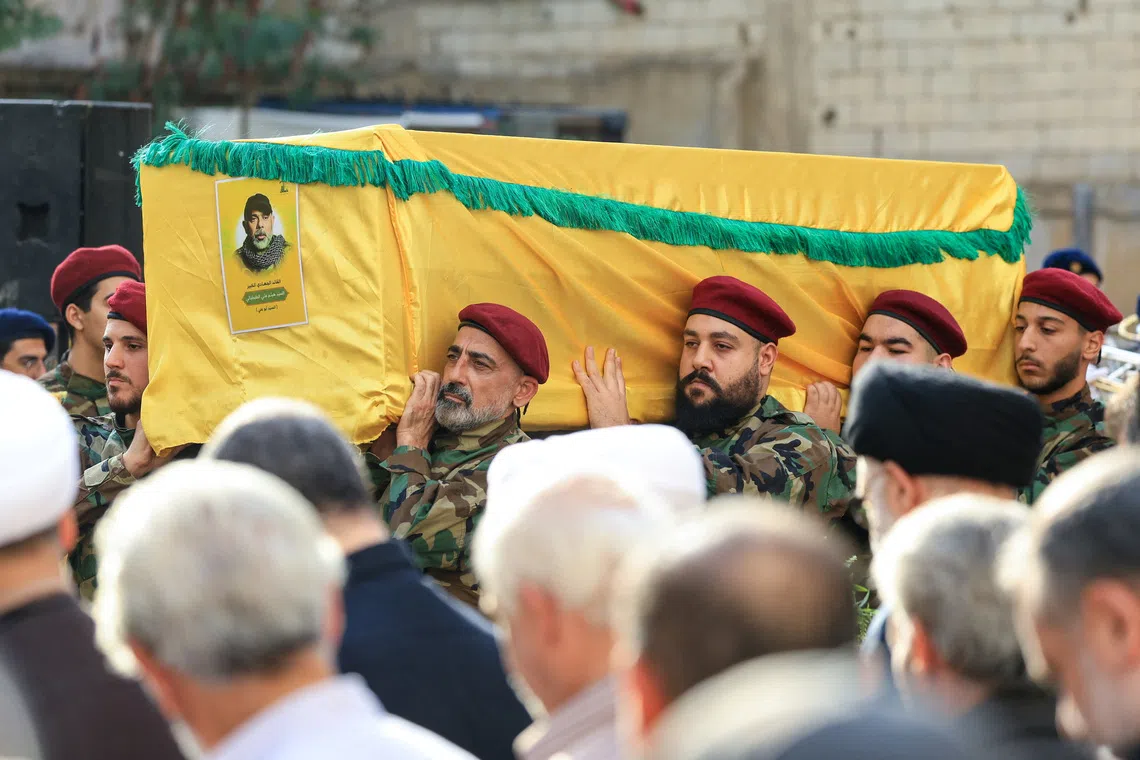The streets of Beirut's southern suburbs became a scene of sorrow and defiance on Monday as hundreds gathered to mourn Haytham Ali Tabtabai, a senior Hezbollah military commander, and four other fighters. Their deaths came in the wake of an Israeli airstrike on the city's outskirts the day before. This targeted assassination, a tactic that had become less frequent since a ceasefire was brokered last year, has reignited anxieties about a potential escalation of hostilities with Israel, occurring notably just one day after Lebanon celebrated its Independence Day.
As the solemn procession wound its way through the capital's neighborhoods, powerful chants echoed through the air, condemning both Israel and the United States. These nations have consistently urged Lebanon to accelerate efforts to disarm Hezbollah, aligning with the terms of the 2024 ceasefire agreement. Amidst the grief, mourners resolutely declared, "We will not leave our weapons, we will not leave our land!" High-ranking Hezbollah political figures were visibly present at the funeral, though the attendance of military officials remained unconfirmed.
Targeting the Next Generation of Leadership
This recent strike highlights what Israeli military and Lebanese security sources suggest is a deliberate strategy by Israel to dismantle Hezbollah's "next generation" of leadership. Tabtabai, 57, rapidly ascended through the ranks following the deaths of many senior commanders during a previous conflict. After the U.S.-brokered truce in November 2024, he was appointed Hezbollah's highest-ranking military official and became a member of its crucial Jihad Council, responsible for overseeing military operations.
The November 2024 ceasefire was intended to halt a year-long conflict between Hezbollah and the Israeli military. This earlier confrontation was ignited by Hezbollah's rocket attacks on Israeli positions, which occurred a day after its Palestinian ally Hamas launched a significant assault on October 7, 2023. During that intense period of fighting, Israel successfully eliminated Hezbollah's then-leader Hassan Nasrallah, his presumed successor, and a significant portion of the group's top military command. A Western diplomat observing Lebanon noted, "Israel is peeling them off layer by layer," underscoring the sustained pressure.
Persistent Surveillance and Enforcement
Despite the ceasefire, Israel has maintained a consistent pattern of near-daily strikes on Lebanon, asserting that these operations target Hezbollah's alleged arms caches, operatives, and attempts to rearm. These strikes have notably intensified in recent weeks. Israeli Defense Minister Israel Katz issued a stern warning: "Anyone who raises his hand against Israel — his hand will be cut off. Prime Minister Benjamin Netanyahu and I are determined to continue the policy of maximum enforcement in Lebanon and everywhere."
Furthermore, Israel has continued its intelligence-gathering efforts, deploying surveillance drones over Lebanese territory. On Monday, Israeli drones were reported flying over Beirut, southern Lebanon, and the eastern Bekaa Valley, according to a Lebanese security source. The advanced capabilities demonstrated by Israel have raised concerns among Hezbollah supporters. Malek Ayoub, a retired military analyst, voiced anxieties on Hezbollah's Al Manar television, suggesting Israel might be employing facial recognition technology to identify Hezbollah figures from media coverage of Tabtabai's funeral, thereby building a "bank of targets."

